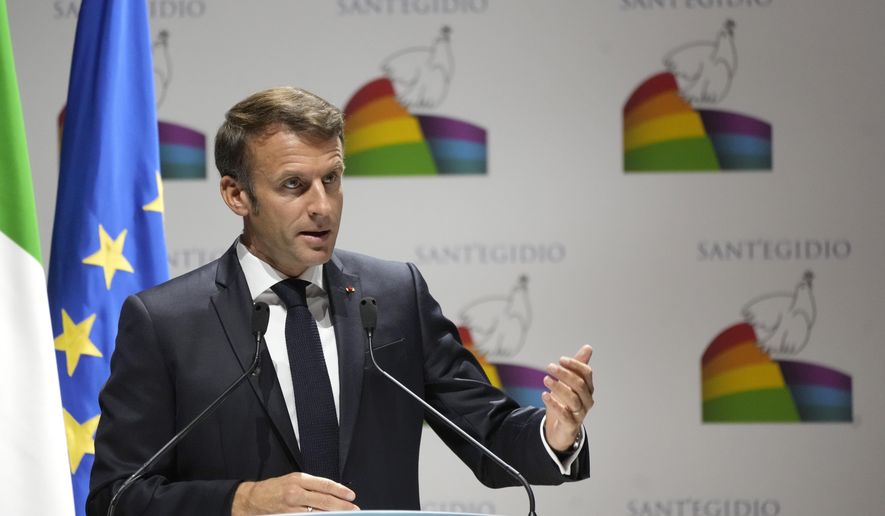ROME — French President Emmanuel Macron said Sunday it’s up to Ukraine to decide the time and terms of peace with Russia, and he cautioned that the end of war “can’t be the consecration of the law of the strongest.”
Speaking at the opening of a three-day peace conference in Rome, Macron said the international community will be there when the Ukrainian government chooses that time.
“To stay neutral would mean accepting the world order of the strongest, and I don’t agree with this,” Macron said at the conference organized by a Catholic charity with close ties to the Vatican.
There is concern that support from Ukraine’s allies in Europe might be eroded due to soaring energy costs with the approach of winter.
Pope Francis is scheduled to conclude the Cry for Peace conference, sponsored by the Sant’Egidio Community, with a speech Tuesday at the Colosseum.
Throughout the war that began with Russia’s invasion of Ukraine eight months ago, the pope has warned against an arms buildup. But he has said Ukraine has the right to defend itself.
PHOTOS: Macron: Ukraine to decide time, terms of peace with Russia
While Italy’s new premier, far-right leader Giorgia Meloni, is a staunch backer of helping Ukraine defend its sovereignty, her coalition allies have pro-Russia sympathies.
Italian state TV broadcaster Rai reported that Meloni and Macron met Sunday evening in Rome.
The French president’s visit to Italy includes an audience with the pope at the Vatican on Monday.
Macron addressed concern that any talk of peace could be taken as a sign of lack of support for Ukraine. “To speak of peace now, call for peace, might seem unbearable for those who are fighting for freedom, it seems like a betrayal” of Ukraine, the French leader said.
But peace cannot be “captured by Russian power,’’ he said. ”Peace can’t be the consecration of the law of the strongest, nor can it be a cease-fire (marking) the state of affairs.”
“We want the Ukrainian people to decide at a certain point, peace, the moment and the terms of peace,” Marcon said.
“Peace will be built with the other (party), who today is the enemy, around a table, and the international community will be there.”
Italy’s main populist opposition leader, former Premier Giuseppe Conte, last week said Italy shouldn’t send more arms to Ukraine.
Macron referred to his past meetings with Russian President Vladimir Putin, the war’s architect.
Moscow’s aggression is “the fruit of exaggerated nationalism” and feeling isolated, the French leader said, noting the aggression was unjustified.
“They were convinced that there were threats, that the rest of the world, the Western world, at least, would have tried to destroy Russia,” he said.
Macron warned against growing sentiments on nationalism on the European continent, where far-right political forces have gained popularity in some nations.
With many religious leaders at the conference, the president exhorted them to foster ”resistance against the folly of war.”
Macron decried that “the Orthodox religion is being manipulated by Russia.” He didn’t elaborate. But Russian Orthodox Patriarch Kirill has fervently backed Putin in the war against Ukraine, calling the invasion part of a “metaphysical” battle against the West.
Keenly aware of Kirill’s closeness to Putin, Pope Francis has sought, so far in vain, to meet with the patriarch during the war.
Ultimately, said Macron, nurturing peace in Europe depends on “equilibrium of respect, reciprocity, justice.” He cautioned against efforts in Europe to “drive out the ‘other’ in our society’’ in a quest for “ethnic purity, religious purity.”
Meloni came to power after an election campaign in which she championed a Christian view of European civilization.




Please read our comment policy before commenting.